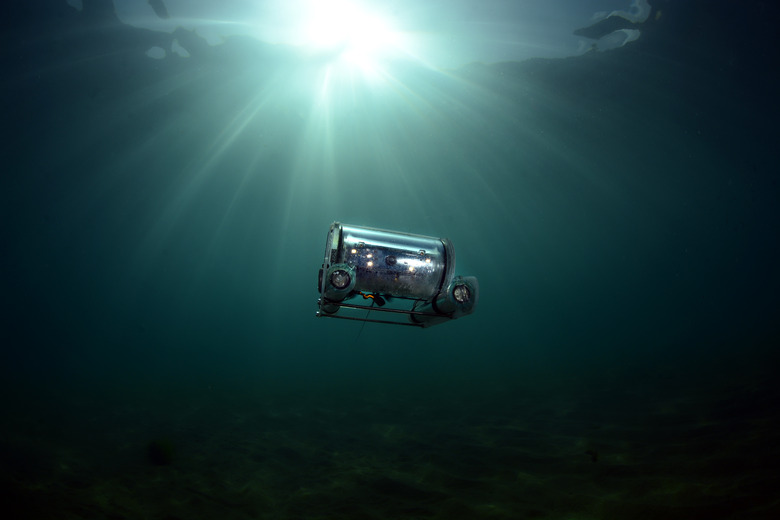Famous Trenches In The Indian Ocean
The oceans of the world vary in size and depth and share the commonality of interesting geographic features beneath them. There are ridges, canyons and trenches, some taller and deeper than those found on land. In the Indian Ocean, some of the trenches are quite deep.
TL;DR (Too Long; Didn't Read)
The deepest places on the ocean floor are called trenches. These troughs extend to great depths, and in the Indian Ocean, there are two particularly deep trenches: the Java Trench and the Diamantina Trench.
What Are Trenches?
What Are Trenches?
Ocean trenches are the deepest places on the ocean floor. They typically arise from tectonic plates moving over time, particularly via subduction. In subduction, older tectonic plates get pushed underneath newer plates, and this creates a deep trench. Subduction often results in some of the world's most powerful and devastating earthquakes.
Ocean trenches occur in all the world's oceans, with the deepest trenches being in the Pacific Ocean. Ocean trenches experience tremendous pressures due to water depth, and any organisms that live there evolved to cope with this harsh, sunless environment. These deep chasms are largely unexplored due to the extreme conditions and challenges of navigating them. Recent expeditions have explored the sea beds of the Indian Ocean, determining the exact depth of its deepest trenches.
Some interesting features of ocean trenches include their pervasive cold temperatures, at just above freezing, and their lack of light. Photosynthesis cannot occur in such conditions. Nevertheless, organic matter that lives in the trenches builds up over time. The ocean trenches of the world store huge amounts of carbon, which could play a role in climate dynamics.
Indian Ocean Trenches
Indian Ocean Trenches
In the Indian Ocean, the deepest places on the ocean floor are the Java Trench and the Diamantina Trench. Numerous other features have been discovered recently, both within and surrounding these trenches. They include fans, seamounts, fault valleys, abyssal hills, canyons, sheer escarpments or steep cliffs, troughs, relics of volcanoes and more.
The Java Trench in the Indian Ocean was recently explored by the Five Deeps Expedition (FDE), which mapped the world's deepest ocean trenches in their highest resolution to date. The expedition determined the Java Trench drops to 7,187 meters (23,560 feet) deep. The expedition achieved its measurements via submersible and lander systems with sensors.
The other exceptionally significant Indian Ocean trench is the Diamantina Trench. This trench occupies a region near the Perth Abyssal Plain, closer to Australia. Other features in this region include the Broken Ridge, Batavia and Gulden Draak Rises and the Australian-Antarctic Basin. The Diamantina Escarpment drops over 5,100 meters (16,732 feet) from Broken Ridge to the great depth of the Diamantina Trench, which lies approximately 5,800 meters (19,029 feet) beneath the ocean surface.
The Importance of the Deepest Places on the Ocean Floor
The Importance of the Deepest Places on the Ocean Floor
Indian Ocean countries benefit from learning more about this deep-sea environment to protect the unique life there. These nations can also learn more about the dynamic geological processes in any trench in the Indian Ocean that sometimes lead to massive, life-threatening earthquakes. The 2004 Indian Ocean tsunami devastated many populations.
Learning about ocean trenches helps for navigation, cable and pipeline placement and fisheries management. Additionally, the deep-sea geological features influence ocean currents that affect the world's weather and heat exchange. Seamounts along these deep chasms are known to be rich in species diversity. Deep-sea explorers of the trenches in the Indian Ocean have found jellyfish and squid at extraordinary depths, underscoring the fact that the deepest trenches house more life than previously imagined.
Hadal, or deep-sea, organisms might also hold the key to potential new treatments in medicine. Organisms that withstand the extraordinary pressures and other limitations of the deep could be sources of pharmaceutical therapies. Additionally, the species adaptations to the deepest places on the ocean floor could help researchers understand ocean life origins. Since nearly 80 percent of the world's ocean floors remain unmapped, there remains a vast frontier in both species and geologic discovery.
References
- BBC News: Oceans' Extreme Depths Measured in Precise Detail
- Woods Hole Oceanographic Institution: Ocean Trenches
- British Geological Survey: Deepest Points of the Indian Ocean and Southern Ocean Revealed
- Marine Geology: Malaysia Airlines Flight MH370 Search Data Reveal Geomorphology and Seafloor Processes in the Remote Southeast Indian Ocean
Cite This Article
MLA
Hermance, Dianne. "Famous Trenches In The Indian Ocean" sciencing.com, https://www.sciencing.com/famous-trenches-indian-ocean-8475388/. 30 September 2021.
APA
Hermance, Dianne. (2021, September 30). Famous Trenches In The Indian Ocean. sciencing.com. Retrieved from https://www.sciencing.com/famous-trenches-indian-ocean-8475388/
Chicago
Hermance, Dianne. Famous Trenches In The Indian Ocean last modified March 24, 2022. https://www.sciencing.com/famous-trenches-indian-ocean-8475388/
